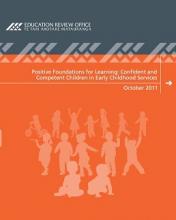Preparedness to implement Te Whāriki (2017)
ERO is undertaking a series of evaluations on the implementation of Te Whāriki: He whāriki mātauranga mō ngā mokopuna o Aotearoa. This report examines how prepared services are to implement Te Whāriki, including their engagement with professional learning and development, and determining 'what matters here' and next steps.



















